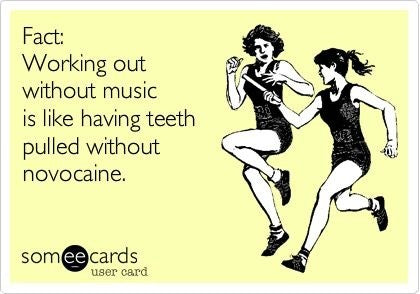The Perfect Music Playlist While Working Out

Whether you run with headphones or not, there is no denying that music can add extra oomph when training or racing. Indeed, this effect is so pronounced that some sports psychologists have called music “the only legal performance enhancing drug.” Tips for making the perfect playlist are described here.
Beats Per Minute
Our bodies love – and even crave – rhythm. We have the ability to synchronize our heartbeats, breathing rates, and circadian rhythms with those of others. We can also synchronize our running cadence the bass line of our favorite songs. If you want an extra boost during hard workouts or need help staying on pace, consider the beats per minute (bpm) of the songs you choose. For speed workouts, look for songs that have 180 – 190 bpm, and fewer bpm (i.e. 150 – 170 bpm) for steady efforts, such as long runs.
Happy vs. Sad
Sports psychologists also know that positivity matters. Choose songs that are uplifting and have energizing lyrics. A positive message can propel you further than a depressing, sad song that leaves you commiserating over a traumatic situation.
Structure your Playlist Accordingly
Next, structure your playlist similar to your workout. Use the first 2 – 3 songs to ease into your run before ramping up the intensity. If you are running a fartlek, aim for a mix between intense, fast-paced songs and a slower tempo. For a long run, start with a steady beat and work into more intense, driving music. For the final two songs, find relaxing music for your cool down.
Short Songs vs. Long Songs
When you are choosing the songs to comprise your playlist, consider length. Short, constantly changing songs can help distract you from a tough workout, but they also make you more acutely aware of how much (or how little) time is passing. On the other hand, long songs can help you achieve a rhythm in your workout, but might become boring. In general, songs 3 – 4 minutes in length tend to be best.
Classical vs. Heavy Metal
Does genre matter? Neurologists have found that the genre you listen to can affect the quality of your workout. Classical music, particularly songs that have a quick tempo such as Beethoven’s Symphony No. 4. fourth movement, can both decrease your perceived effort, as well as decrease the amount of stress hormone, cortisol, your body produces. On the other hand, heavy metal music (a common mainstay at gyms and on runner’s playlists) has been shown to affect anger and arousal. If you are struggling to find motivation to get out the door and run, a dose of heavy metal can help; but music that leads to positive emotions might be more beneficial during exercise.
Throwbacks
When all else fails, add songs to your playlist that evoke strong, positive memories from a previous period in your life. For instance, the go-to party jam when I was in college was Miley Cyrus’ Party in the USA. If this song comes on during a run, it’s hard for me not to smile and pick up the pace!
Leave a comment
Comments will be approved before showing up.



